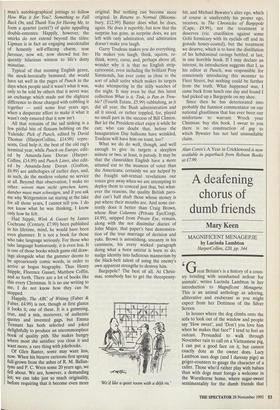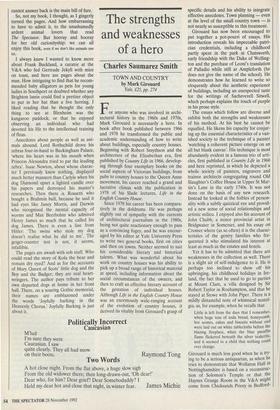A deafening chorus of dumb friends
Mary Keen
MAGNIFICENT MENAGERIE by Lucinda Lambton HarperCollins, f20, pp. 344 reat Britain's is a history of a coun- try bristling with unashamed ardour for animals', writes Lucinda Lambton in her introduction to Magnificent Menagerie. This is an animal anthology as adoring, alliterative and exuberant as you might expect from her Dottiness of the Silver Screen.
In houses where the dog climbs onto the sofa to look out of the window and people say 'How sweet', and 'Don't you love him when he makes that face?' I tend to feel an outcast. Persuaded to walk through November rain to call on a Vietnamese pig, I can put a good face on it, but cannot exactly dote as the owner does. Lucy Lambton uses dogs (and I daresay pigs) as geiger-counters to gauge the character of a caller. Those who'd rather play with babies than with dogs must forego a welcome in the Worsthorne home, where sugar-sweet sentimentality for the dumb friends that
`Gi
cannot answer back is the main bill of fare.
So, not my book, I thought, as I gingerly turned the pages. And how embarrassing to have to admit it, to the unashamedly ardent animal lovers that read The Spectator. But hooray and hooray for her old curiosityship: we can all enjoy this book, even if we don't like animals one bit.
I always knew I wanted to know more about Frank Buckland, a curator at the V&A who fed Gertrude Jekyll with mice on toast, and here are pages about the man. How intriguing to find that he recom- mended baby alligators as pets for young ladies in Southport or doubted whether any Brighton lassie could find a prettier object to put in her hat than a live herring. I liked reading that he thought the only thing to see at Blenheim was the kangaroo paddock; or that he enjoyed observing an individual who had devoted his life to the intellectual training of fleas.
Anecdotes about people as well as ani- mals abound. Lord Rothschild drove his zebras four-in-hand to Buckingham Palace, `where his heart was in his mouth when Princess Alexandra tried to pat the leading zebra'. Isaac Newton, about whose charac- ter I previously knew nothing, displayed much better manners than Carlyle when his dog Diamond upset a lighted candle over his papers and destroyed his master's researches. Then there is Rossetti who bought a Brahmin bull, because he said it had eyes like Janey Morris, and Darwin who recognised the mental capacity of worms and Max Beerbohm who admired Henry James so much that he called his dog James. There is even a line from Hitler: 'The swine who stole my dog doesn't realise what he did to me'. The geiger-counter test is not, it seems, infallible.
The pages are awash with sob stuff. Who could read the story of Kola the bear and remain dry eyed? And as for the accounts of Mary Queen of Scots' little dog and the Boy and the Badger; they are real heart- wringers. The author pays tribute to her own departed dogs at home in her front hall. There, on a soaring Gothic memorial, their names are emblazoned under the words 'Joyfully barking in the Heavenly Chorus.' Joyfully Barking is just about it.











































































 Previous page
Previous page